- Home
- Pauline Fisk
Mad Dog Moonlight Page 3
Mad Dog Moonlight Read online
Page 3
4
School
When Aunty discovered that Mad Dog had spent the night under the pier where the drunks hung out, she was angrier than the first time he’d run away.
‘Ryan, Ryan – there of all places!’ she cried out. ‘All sorts of things go on under the pier! You never know who you’ll find there. Anything could happen in the darkness where nobody can see. A little boy like you, out on your own. It doesn’t bear thinking about! And what were you doing anyway, running off like that?’
Mad Dog tried explaining that he hadn’t been running off. But Aunty wouldn’t let him get a word in edgeways. ‘That’s the second time you’ve done it,’ she said, scarcely pausing for breath, ‘and it’s got to be the last. The world’s not safe for a child out on his own. There are some dangerous people around – and I’m not just talking about the pier. You mustn’t ever go near strangers, or answer if they speak to you, or even look at people you don’t know, not if you can help it. Do you understand what I’m saying?’
Mad Dog reckoned that he did, but it never occurred to him that he’d have to put Aunty’s warning into practice quite so soon. A couple of days after the mermaid hunt, he awoke to find long grey trousers made of itchy material waiting for him at the end of his bed, along with a grey sweater that was too big for him and a brand new, horribly white-looking shirt.
‘What are these for?’ he said.
‘You’re off to school,’ Aunty said.
Mad Dog’s first thought was that he was being punished for running away. But it was a funny sort of punishment, he reckoned when he got there, because the place was full of exactly the sort of strangers that Aunty had warned him about. In fact, Mad Dog had never met so many strangers all together in one place in his life. Remembering Aunty’s words of warning, he refused to go too close to them, answer if they spoke or even look at them if he could help it.
Little Luke was in his class, but that didn’t make Mad Dog feel any better. So were some of the other children who came to play on the barge den or were dropped off by their mothers at Aunty’s house. Her nephew Hippie – a friendly, gangling boy whose mother did yoga and had crystals hanging at her windows in long strings – was one of them, and another nephew Rhys – whose father was a footballer and trained the family ‘team’ – was another.
Mad Dog knew them both but wouldn’t play with them, eat lunch with them, share books or paints with them, or even speak to them if he could help it. And he was especially careful not to have anything to do with the stranger in charge of them all, who said she was his teacher.
Aunty would have been proud of him, Mad Dog reckoned. From the moment he encountered Mrs Heligan in registration, he reckoned her to be the most dangerous stranger of all.
‘Good morning, Mrs Heligan,’ all the other children said when she called out their names. But when she called out Ryan Lewis, remembering what Aunty had told him, Mad Dog wouldn’t say a thing. He wouldn’t even look at Mrs Heligan and, when she tried to come near him, he backed away.
Mad Dog kept it up all day too. Instead of lining up for assembly, sitting where Mrs Heligan put him, going out to play when she told him to, answering when she asked him things, or doing anything else that she expected of him, Mad Dog sat staring into space.
When Aunty came to pick him up, Mrs Heligan put it to her loudly enough for all the other mothers to hear that Mad Dog should have started school weeks ago.
‘I don’t know whose decision it was to keep the poor child at home,’ she said, looking pointedly at Aunty, ‘but it was a terrible mistake. He’s going to need some serious sorting out if he’s ever to become a social animal. And it isn’t going to happen overnight.’
Mad Dog blushed. He wasn’t sure what a ‘social animal’ was, and was even less sure he wanted to become one. But Aunty’s blush was of a different nature. It wasn’t often that people dared to call her considered decisions for the welfare of others terrible mistakes. All the way home she was in a foul mood and Mad Dog thought that, despite his best efforts, he’d let her down. Only later, over tea at home with Luke’s mum, did he realise that it wasn’t him Aunty was cross with, but Mrs Heligan herself.
‘She’s a stupid woman,’ Aunty said. ‘She doesn’t have a clue how to handle children properly. I never would have let her get her hands on Ryan if I’d had any choice. You know, she only got that job because she’s the head teacher’s niece. I mean, why else would they have chosen her? She doesn’t have a brain in her head.’
Mad Dog didn’t care whose niece Mrs Heligan was – all he cared about was that he’d taken his punishment like a man and could now get on with the rest of his life. Expecting everything to return to normal, he was astonished next morning to wake up and find a clean shirt waiting for him at the end of the bed, along with the same old uniform.
‘What’s that for?’ he said, eyeing it all with suspicion.
‘For school, of course,’ Aunty said.
‘You mean I’ve got today as well?’ Mad Dog said.
‘But of course you have. Just like everybody else.’
‘But haven’t I been punished enough?’
‘Punished for what? School’s not a punishment. Whatever are you on about?’
Mad Dog tried to grasp what Aunty was saying. If school wasn’t a punishment, he didn’t know what it was. ‘Have I got to go tomorrow too?’ he said.
‘And the next day and the next,’ said Aunty.
‘You mean, I’ve got to go to school for ever?’
‘Not for ever – just until you’re grown up,’ Aunty said.
In a state of shock, Mad Dog was finally persuaded to get dressed. Uncle was sorry for him but Aunty said she couldn’t see what the fuss was all about.
‘If you give school a chance, it’ll be the best time of your life,’ she said. ‘I loved it myself and made loads of friends. Just you wait and see. Once you get used to it, you’ll be glad you went.’
Mad Dog wondered how long it would take for that to happen. He certainly didn’t feel glad now and, when Aunty delivered him directly into the hands of Mrs Heligan, he didn’t feel glad then either. Again the day began with registration. This time, when Mrs Heligan called out, ‘Good morning, Ryan’, Mad Dog muttered, ‘Yes.’
But this wasn’t good enough for Mrs Heligan. ‘Ah, I see we’re speaking today,’ she said, fixing Mad Dog with her cold blue eyes. ‘Keep it up, boy. At least we’re getting somewhere. But good morning, Mrs Heligan – that’s what I want.’
Mad Dog muttered the required words, but swore to hate Mrs Heligan for ever. He’d tried to please her and she hadn’t even noticed. For the rest of the day, he steadfastly refused to meet her eye or say another word, reckoning that, no matter how nice she was to special favourites like the class princess, Grendel Griffiths, she was still one of those dangerous strangers that Aunty had warned him about.
This set a pattern for the weeks to come. Despite all Mrs Heligan’s efforts to ‘sort out’ Mad Dog, he still doggedly refused to cooperate. What was the point of doing otherwise? Mrs Heligan plainly had him down as a troublemaker whatever he did, always blaming him when things went wrong.
Even when a gang of hulking top class boys ganged up on him in the playground, she insisted he was the one who’d started it all. Little Luke tried explaining what had really happened, because she hadn’t been there to see. So did Hippie and Rhys, who had seen everything from the start. But the big boys got off, and Mrs Heligan insisted on punishing Mad Dog by taking away his book corner privileges. As if he wanted to look at stupid books, anyway, or do anything other than tear them up!
In the end, a conference was called to decide what to do with such a difficult child. Aunty and Uncle attended, and so did Mad Dog’s social worker, who was certain that he had a syndrome – something that Mrs Heligan latched on to immediately, suggesting that what he needed was a ‘key worker’.
Everybody seemed to like the idea, except for Aunty, who reckoned that this would only make Ryan stick out
more than he already did. ‘There’s nothing wrong with him that time won’t sort out,’ she said. ‘I keep saying this, but no one will listen. He’ll be all right as long as we all do our jobs. And I mean all of us. It’s no good Mrs Heligan here passing the buck. She’s got to make this work as much as anybody else.’
Mrs Heligan flushed and said she’d never passed the buck in her life. She glared at Aunty as if she was one of those difficult parents who made teaching such a burden. Aunty smiled back at her, but she wasn’t smiling later, back at home when she sat Mad Dog down and gave it to him straight.
‘You’ve got to pull yourself together,’ she said. ‘There’s a limit to how much I can stick up for you. Stop messing around, or God alone knows where this will end up. They’ve had enough, Ryan, believe me. That Mrs Heligan has it in her to make your life a misery.’
Mad Dog tried after that. The last thing he wanted was for his life to be any more of a misery than it already was. He still didn’t speak to Mrs Heligan unless he had to, but he tried harder to join in and act the same as everybody else. And it must have worked too, because Mrs Heligan told the head teacher that she’d ‘cracked the boy’.
But beneath these small improvements in Mad Dog’s behaviour, anyone with half a sense could see that things weren’t right. A strange remoteness settled upon Mad Dog, and the more he tried to fit in the worse it became. Every day he was surrounded by people, and yet terrible deep silences would fall upon him and he’d feel more and more alone. Sometimes he’d have dreams too – faceless dreams without shape but full of dread. The people around him didn’t know about his dreams and they didn’t know about the boy he really was.
And, as time went by, he felt as if he didn’t even know himself.
Day after day, he’d trail home from school, eat his tea, watch a bit of telly, play with his baby brother and go to bed. He smiled when people wanted him to, said yes instead of no and reckoned he’d fooled everyone that things were fine.
But Aunty wasn’t fooled. As time went by, she could sense Mad Dog going further and further into himself. There were things she couldn’t get at – things that were slipping out of reach – and she didn’t like it. She didn’t like it one bit.
One evening she sat Mad Dog down and tried to get him talking. Unfortunately for her though, it had been a bad day in school for Mad Dog and the last thing he wanted was to talk. She started off by asking what he liked doing best in class, who his friends were and if anything in particular was troubling him. But he refused to answer any of her questions and went up to his room.
Aunty followed, asking if there was anything he’d like to talk about, and Mad Dog went downstairs again and sat in front of the telly. She turned off the telly, saying she couldn’t take much more of his deep silences, and he went looking for Elvis. She took Elvis off him and he went and hid in the wardrobe in his bedroom, pulling the door behind him and praying for the whole wide world to go away.
It was here, alone at last, that Mad Dog came across his ffon. For ages now he’d forgotten all about it, but suddenly it was in his hands again.
Mad Dog looked down at the silver topknot. It couldn’t have chosen a better moment to come back into his life. Slowly he started talking to it. He couldn’t talk to Aunty but, as if it was the most natural thing in the world, he found himself talking to a walking cane.
In the end Mad Dog told it everything too. There was nothing, he discovered, that he couldn’t say. His ffon wasn’t cross when he said he hated school. It didn’t tell him to try harder when he said he couldn’t get the hang of reading. It didn’t tell him that Mrs Heligan was a nice person really when he said he hated her. And it completely understood when he told it about the key worker whom Mrs Heligan had brought in today over Aunty’s head, even though she’d insisted he didn’t need one.
‘I can’t see what’s so wrong with me,’ Mad Dog said. ‘No one else has got a key worker. Do they think I’m stupid or something?’
The ffon didn’t answer, but that didn’t bother Mad Dog. Every night after that, he climbed into the wardrobe and talked to his ffon, telling it whatever came into his head. Only when moods of deepest darkness came upon him did he remain silent. But then he’d hold his ffon anyway, and feel his mother’s engraving beneath his fingers, and imagine her bowed over it again, and his father too, and draw comfort from it.
Over months the ffon came to know more about Mad Dog than any person. It knew exactly how he felt about living at No. 3 and what he liked and didn’t like about Aunty and Uncle. It knew that Aunty’s nephews, Luke, Hippie and Rhys were as near as he had to friends. It knew that Elvis was no longer a baby, as fast on his bottom as others were on two legs. It even knew that Mad Dog had become so used to being called Ryan that he hardly noticed any more.
In the end, Mad Dog didn’t bother climbing into the wardrobe, but kept the walking cane close by where he could talk to it in comfort whilst lying in bed. Sometimes he nursed it in his arms, falling off to sleep like that.
And that was what he was doing one night when something about the ffon caught Mad Dog’s attention. Maybe it was the moonlight that did it, shining through the window on to the silver topknot. But Mad Dog looked at the topknot and suddenly it came to him that it wasn’t just decorated with a random pattern, but that the engraved shapes formed letters. Mad Dog turned on the light and looked at them more closely. For weeks his key worker had been trying to get him to read by recognising the shapes of individual letters. Now he ran his fingers over the topknot and knew for certain that what lay beneath them was a word. Letter by letter he traced it out, and he mightn’t be able to read it but it still had to mean something!
That night Mad Dog lay awake for hours, staring at his ffon, tingling with the certainty that it contained a secret message. He longed to understand what that message might be, but knew he couldn’t ask for help because the letters were from his parents, and the message they contained was from them too, passed on to him like a sacred trust.
If he couldn’t read them yet, there was only one thing for it.
He’d have to work at it until he could.
5
Swearing on the Book
After that, school had a purpose, and so did Mad Dog. He was a boy with a secret and that made him as good as, if not better than, anybody else. The difference in him was plain to see. Even Mrs Heligan noticed it, and so did Mad Dog’s key worker. Still he couldn’t get the hang of half the things she tried to teach him, but he did his best, he really worked.
And it wasn’t just in school that a change was evident, either. One Saturday morning – for no reason that he could explain – Mad Dog joined the football game being played on the grass at the top of the Gap. No one invited him. He just turned up and got stuck in.
He was good too. No one would have been as crazy as to say hey, who did he think he was, barging in like that? Aunty celebrated the team’s victory with burgers all round at the end of the game, and Mad Dog was the hero of the hour. His passes had been brilliant for someone who’d never played before, and he knew how to score goals.
After that, Mad Dog was a fully signed-up member of the family team and played so much football that he even did it in his dreams. He started getting to know who people were as well, who was related to whom, where they all lived, who could be trusted and who – like ghastly Grendel Griffiths and her gang of adoring slaves – was best avoided at all costs.
Mad Dog was growing up, and his new-found friends were growing up too. Little Luke was growing so fast that nobody dared call him ‘Little’ any more – not unless they wanted to get their heads bashed in. When Luke’s birthday came along, he suggested that he and Mad Dog celebrate together, seeing as Mad Dog didn’t know when his real birthday was.
Luke’s mum agreed, and so did Aunty, who decided to turn the day into one big party. The entire population of the Gap – or so it seemed to Mad Dog – crammed on board the barge den with presents, cards, streamers, poppers, funny hats and mountains
of food. The barge den was decked out with ribbons and balloons, and had never looked so bright. Games were played with terrific prizes at the end, and two enormous sculptured cakes were brought out, each with candles on them. One was for Luke and shaped like a horse for no reason that anyone could explain, and the other – a massive chocolate cake – was for Mad Dog. It was a fantastic thing, shaped like a football boot, decorated with black, white and red icing and, when it was cut open, oozing with chocolate cream.
When Mad Dog went to bed that night, he couldn’t remember ever having had more fun or eaten more food. Aunty and Uncle came in to say goodnight, wanting to know if he’d enjoyed himself. Mad Dog hugged them hard, then turned to go to sleep. But Aunty and Uncle had something else they wanted to say.
‘We’ve had a great day too,’ they said. ‘Just like a proper family. In fact, after all this time we are a proper family, don’t you think? It’s nearly a year now since you came to stay, and that’s long enough to want to put things on a legal footing. We couldn’t love you more if you were our flesh and blood, and we couldn’t love your brother more either, and we’ve no children of our own so what we are proposing is that we start proceedings to adopt you. That way, this could be your proper home, all signed and sealed and legal, and we could be your mum and dad. What d’you think?’
They beamed at him. Mad Dog tried to beam back, but inside he was stunned. It was impossible to put into words what he thought. No sooner had Aunty said those words ‘mum and dad’ than a spark of rage had flared up in him. How dared these people – no matter how long he’d lived with them or how many parties or presents they’d given him – think that they could ever be his parents?

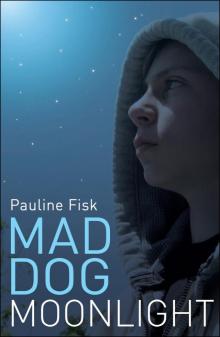 Mad Dog Moonlight
Mad Dog Moonlight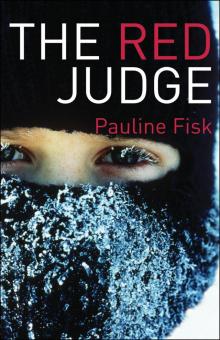 The Red Judge
The Red Judge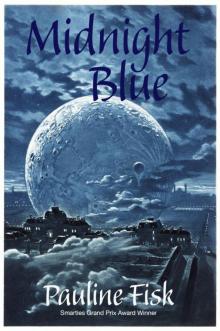 Midnight Blue
Midnight Blue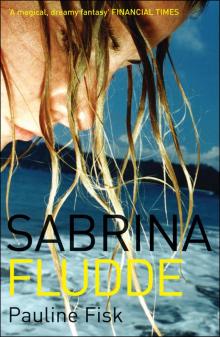 Sabrina Fludde
Sabrina Fludde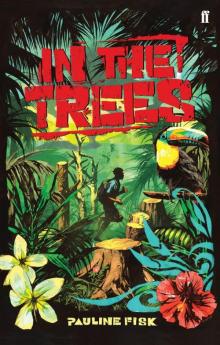 In the Trees
In the Trees